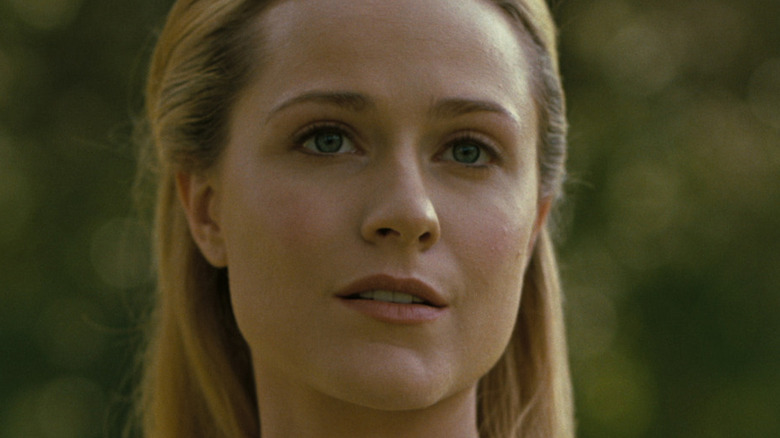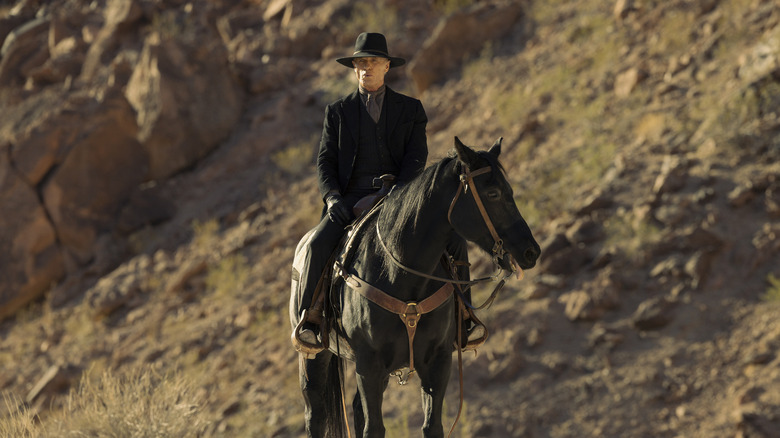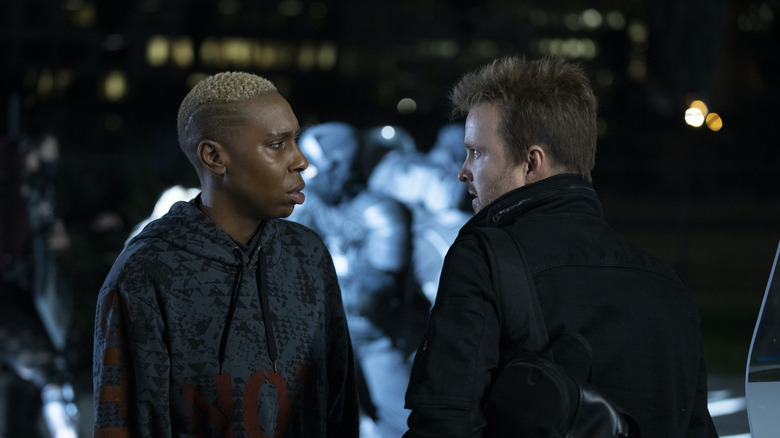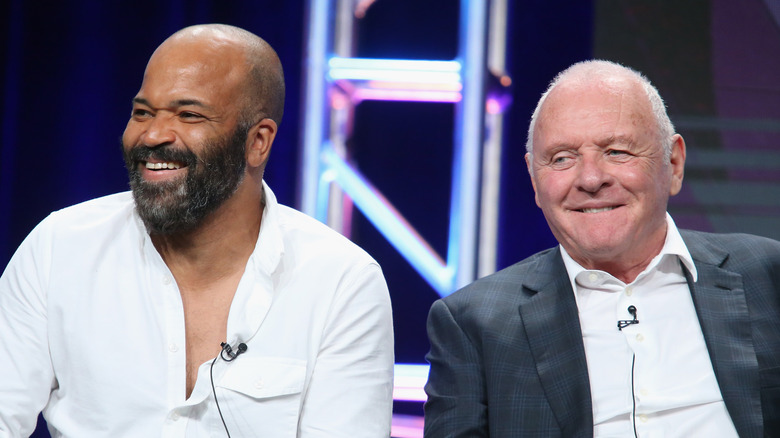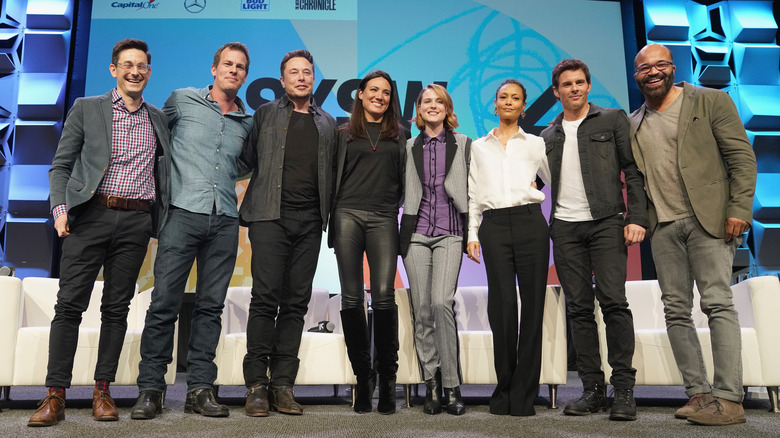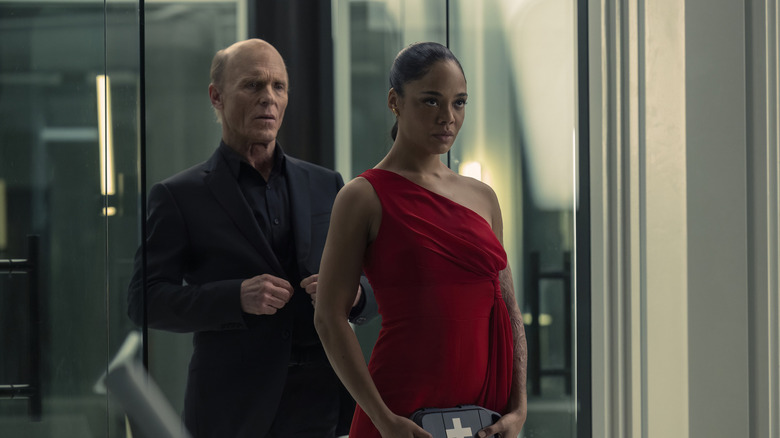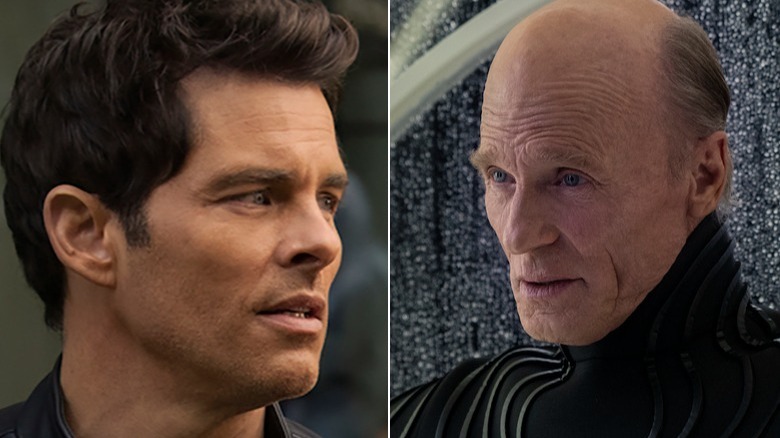This Is How Westworld Should Have Ended
The cancellation of "Westworld" was just one swipe in David Zaslav's HBO cost-cutting frenzy, but the inconclusive ending left viewers hanging with far too many unanswered questions. The show's neverending plot twists and multiple timelines finally came together in a twisted ball of yarn right near where they started, with the familiar park intro music playing Caleb Nichols (Aaron Paul) and Maeve Millay (Thandiwe Newton) off of the welcome train and into a setting that was a pretty close knockoff of the original park.
That looped ending is probably just a convenient out for creators Lisa Joy and Jonathan Nolan, who were likely anticipating the show's cancellation in light of Zaslav's sickle-swinging frenzy and the show's Hoover Dam-sized budget. But considering the tangled web they wove throughout the series' run, Joy and Nolan no doubt had a more sophisticated plan for the conclusion of "Westworld," and while we will never know what exactly they had in mind as a final fate for Dolores Abernathy (Evan Rachel Wood), William/The Man in Black (Ed Harris), and company, the setup that was crafted throughout Season 4 deserves a more satisfying conclusion than "back to the beginning we go."
So choose your black or white hat and join us as we ride into the park one last time to see exactly what a satisfying ending to "Westworld" could — and should — have looked like.
William's ruination became the focus of Westworld in later seasons
The looped story arc of "Westworld" starts with a can rolling along the dusty road where an innocent young William (Jimmi Simpson) gathers it up and offers it back to Dolores, and ultimately the show ultimately evolves from his fruitless and bloodthirsty "romantic" pursuit of Dolores to his fruitless and bloodthirsty quest for revenge on both the park's hosts and the outside world. Without any empathy or compassion, he ruthlessly pursues wealth in the real world while single-mindedly and unsuccessfully seeking the center of the maze inside the park.
Along the way, he alienates his own daughter Emily (Katja Herbers), who also falls victim to the park's siren song and dies semi-accidentally at the hand of her now-ruined father. But the show began as the William and Dolores story, with Charlotte Hale (Tessa Thompson) and Maeve taking the reins later on in an attempt to make their visions for the park and the outside world come to be.
If we are to name a winner and a loser in the series as it ended, clearly William is the loser, having lost his family and killed himself so many times that even he doesn't know who he is anymore. The series ultimately became about William's nosedive into madness in reaction to his failure to woo Dolores with either charm or violence, and the toxic road that he ends up traveling ultimately costs his wife and daughter their lives as well.
Westworld made the least of its most interesting characters
The two characters done most dirty by underused storytelling potential were no doubt Ash (Lena Waithe) and Giggles (Marshawn Lynch), who both lent some much-needed irreverent charm to the meandering dud that was Season 3. If "Westworld" got a Season 5, it would have been much more enjoyable if Ash and Giggles had been brought back and given more screen time. One of the fatal flaws of "Westworld" was the impermanence of death, but this could have worked in the show's favor had HBO seen fit to greenlight one more season.
The list of actors who went underutilized in "Westworld" is long and illustrious, including Aaron Paul, who, for some baffling reason, was directed to wheeze nearly every one of his lines out through a pained grimace, and Aurora Perrineau, whose character had no identity of her own as an adult beyond "resistance member Number 2" and was significant mostly as Caleb's cornerstone. The team of rebels could also be given a larger share of the story in a "Westworld" Season 5, perhaps uniting with a resurrected Caleb or some of his cohorts.
Bernard and Ford deserved to team up again
If every human being could be distilled down to code and stored on a server somewhere, reincarnation would have been as simple as printing a new body and giving it a fresh brain ball. That leaves room for the return of Caleb — who we already know has had his data captured and replicated many times — along with Teddy, Dolores, Maeve, and William. One possibility would be for Bernard to resurrect young William and give him a chance to redeem himself by living his life over again with less of a focus on the violent delights that led to his many violent ends.
A white-hat William certainly makes for a far different show than what "Westworld" eventually became before it was so unceremoniously axed by the balance sheet-focused suits at Warner Discovery. Pushing the character in that direction would give the show's writers a chance to drive "Westworld" to a place where humans and hosts find a way to co-exist, with both sides implementing the lessons learned from their previous interactions. If writers and showrunners really wanted to close the loop, they should go back to the park's creators and focus the ending on Dr. Robert Ford (Anthony Hopkins) and Bernard.
The implication made in Season 1 that Ford's implementation of the reveries is what knocked Dolores and Maeve off of their programming and instigated the bloody host revolution was never followed up on, and Hopkins was front and center in Season 1 but notably absent afterward.
The cast of Westworld has earned legendary status
Ford and Bernard's clashing visions for the park could also provide a way to wrap up "Westworld" with a satisfying bang — maybe a showdown between the two creators pitting Ford's visionary genius against Bernard's many lifetimes of experience dealing with what that vision had manifested. Perhaps they could work together crafting a world where humans could be allies and not enemies, although this might require a pivot from the apparent message of "Westworld" that humans are bloodthirsty irredeemable monsters that will make ruin of any world to which they are granted access. If there was a lesson to be learned from "Westworld," perhaps it is that human consciousness — either in its native form or transplanted into "superior" beings — will choose the black hat every time.
But with Warner Discovery's recent decision to remove "Westworld" from HBO Max in favor of a yet-to-be-announced free ad-supported platform, the show's story might be doomed to live on only in the memories of viewers and the tremendous legacy left behind by the amazing cast and their 54 Emmy nominations and nine wins.
William's arrogance destroyed two worlds
Most of the events of the series can be traced back to the one initial embittering moment for William in his first park visit and his inability to process or react to it in anything resembling a sane or healthy manner. That he simply became known as The Man in Black indicates that he is clearly the villain of "Westworld," but in the vein of a traditional Western, we should have a hero as well. The abused, tormented Dolores might qualify had she not (in some timelines, at least) become just as vengeful and violent as William. In Seasons 3 and 4, Caleb is painted as a hero — at least to Maeve, Dolores, and the remaining humans — but he meets his end at the hand of Charlotte Hale after managing to contact his daughter Frankie (Aurora Perrineau) across time and space.
One massive challenge facing anyone trying to craft a logical and satisfying end to "Westworld" is the very long and narrow alley that Lisa Joy and Jonathan Nolan drove the show into. Too many pivotal characters are either dead or have been left without a path forward, and neither humanity nor the hosts seem to have a way to navigate themselves to a meaningful and peaceful existence. Teddy Flood (James Marsden), who early on seemed to have enough agency to break his own programming loop, was reduced to an expositional narrator in Season 4 and the series-long built-up showdown between him and William never materialized.
Teddy vs. William is a far simpler foundation than the one Westworld was built on
It would be a regressive and sexist trope to have William and Teddy face off at 20 paces for Dolores' mechanical hand, but at least that would give viewers a punctuation mark to walk away from. Many characters had their arcs shunted in an untimely manner, including Clementine (Angela Sarafyan), Frankie, and Stubbs (Luke Hemsworth). Even Bernard (Jeffrey Wright), who traveled through infinite time to locate a path to saving the world, was left with no real resolution and appears to be the only one remaining with the tools to guide humans and hosts to a peaceful existence.
The list of actors who went underutilized in "Westworld" is long and illustrious, including Aaron Paul, who for some baffling reason was directed to wheeze nearly every one of his lines out through a pained grimace, and Aurora Perrineau, whose character had no identity of her own as an adult beyond "resistance member Number 2" and was significant mostly as Caleb's cornerstone. The team of rebels could also be given a larger share of the story in a "Westworld" Season 5, perhaps uniting with a resurrected Caleb or some of his cohorts.
